In this article:
You may have difficulties sleeping at times due to several reasons, such as stress, change in location, medicinal effects, nocturia, and illness or pain. But if trouble sleeping has become a regular occurrence such that they take a toll on your daily lives, you may be suffering from some kind of sleep disorder.
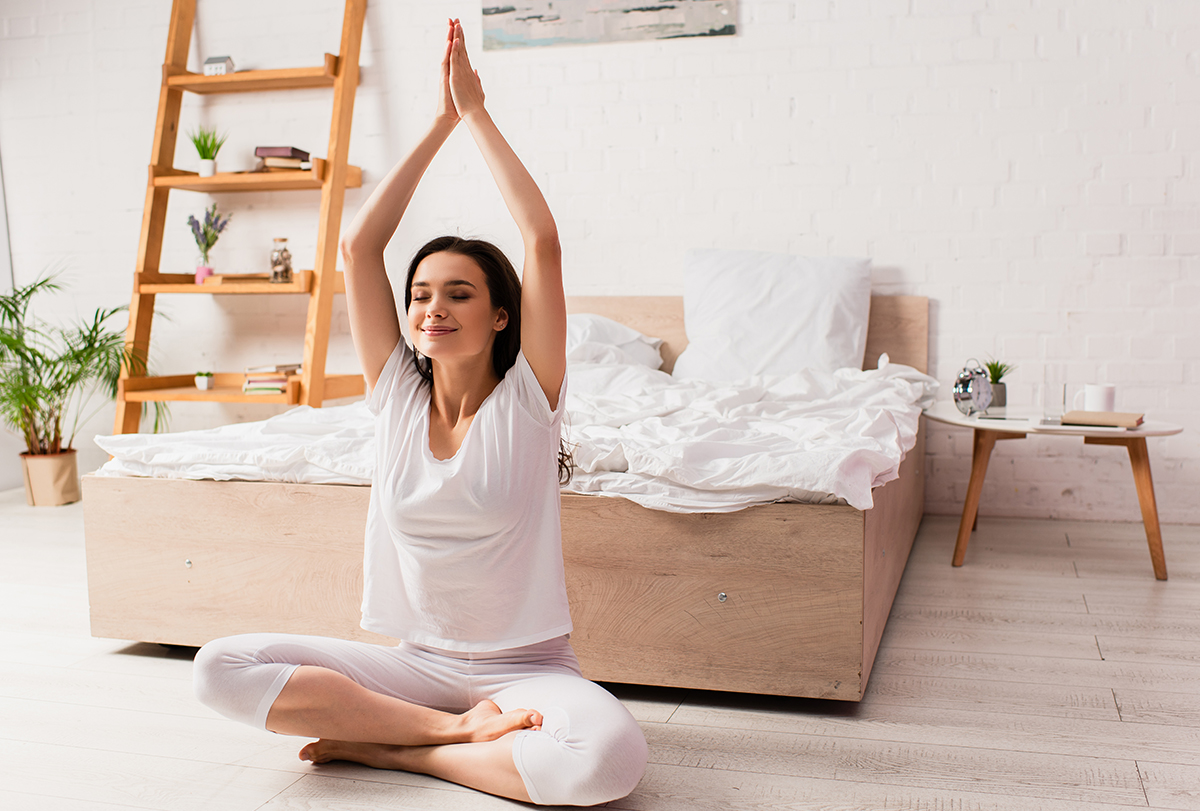
There are many different kinds of sleep disorders, so it is important to get a proper diagnosis before you can start with the appropriate treatment for your particular condition.
Plus, there are certain things you can do at home that can help you sleep better.
Home Remedies for Good Sleep
Here are 10 natural ways to promote sound sleep.
1. Massage therapy
Massage therapy works as a natural sleep disorder remedy. Massage has a generalized effect on the autonomic nervous system, which results in mood upliftment and relaxation response. It also improves blood circulation and relaxes the nerves to help you sleep soundly.
In a 2014 study published in the journal Sleep Science, researchers explored the hypothesis that massage therapy would produce beneficial effects in postmenopausal women through inflammatory and immunological changes and ultimately came to the conclusion that massage therapy is, in fact, therapeutic. (1)
Another 2017 study published in Evidence-Based Complementary and Alternative Medicine suggested that aromatherapy massage could improve the sleep quality of nurses with monthly rotating night shifts. (2)
How to perform:
- Slightly warm some coconut oil or mustard oil.
- Rub the warm oil on your neck, shoulders, back, and the bottom of your feet.
- Massage the body parts in circular motions for 5 to 10 minutes.
- Do this remedy daily before going to bed.
2. Exercise daily
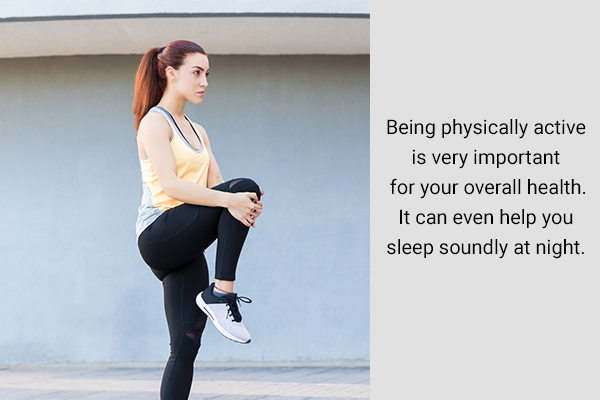
Being physically active is very important for your overall health. It can even help you sleep soundly at night.
It has been found that physical activity can improve sleep, but improving sleep has not been linked to increased levels of physical activity. (3)
In a 2015 study, participants exercised for at least 150 minutes per week for six months. It was found that the participants experienced significantly fewer symptoms of insomnia as well as reduced symptoms of depression and anxiety. The study was published in the Journal of Sleep Research. (4)
To reap the benefits of exercise to fight sleep problems, even light exercise will do and is better than no activity at all. However, the time of the exercise matters a lot.
According to a study published in the Journal of Sleep Research, vigorous late-night exercise does not disturb sleep quality. However, it may have effects on the heart rate during the initial sleeping hours. (5)
Note: Try to avoid doing exercise late at night or just before going to bed.
3. Regular yoga will help you sleep better
Just like exercise, yoga is also beneficial when suffering from sleep-related problems. Yoga helps mitigate stress by taking your mind off the daily tensions, improves physical functioning, and boosts mental health. All these factors are conducive to a night of better sleep.
A study published in the Journal of Ayurveda and Integrative Medicine found that the inclusion of regular yoga exercises in the daily routine improves sleep quality and thereby the quality of life. In this study, a total of 65 elderly men and women participated. (6)
In another 2014 study published in Alternative Therapies in Health and Medicine, researchers found regular yoga to be a safe and effective method in improving overall sleep quality, sleep efficiency, sleep latency, and sleep duration in insomnia-afflicted adults. (7)
When it comes to yoga, choose a style that focuses more on meditation or breathing as opposed to difficult physical maneuvers. Some of the ideal poses include Child’s Pose, Standing Forward Fold Pose, Sitting Forward Fold Pose, and Cat and Cow Stretching Pose.
4. Try mindfulness meditation
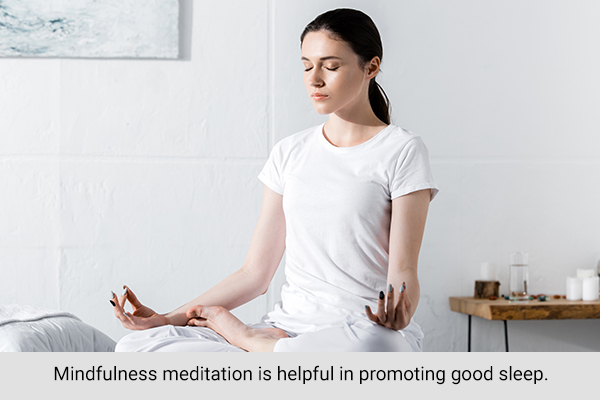
Mindfulness meditation is helpful in promoting good sleep. It consists of slow, steady breathing while sitting quietly. It allows you to zone out of the hustle-bustle of daily life and turn inwards by turning your focus on observing your breath, body, thoughts, feelings, and sensations as they arise and pass.
It does not just calm your mind and body but also helps in fighting stress and anxiety that often contribute to sleep-related problems.
In a study published in the journal Explore, researchers found that mindfulness-based stress reduction (MBSR) significantly improved insomnia and overall sleep patterns. In this study, participants attended a weekly meditation class and a daylong retreat and practiced at home for a few months. (8)
In another 2015 study published in the journal JAMA Internal Medicine, researchers analyzed 49 men and women around the age of 66 who were experiencing poor sleep but didn’t have a diagnosed sleep disorder. (9)
Participants were divided into two groups – one group was enrolled in a standard sleep hygiene education program, and the other group learned mindful awareness practices. After six weeks, it was found that people doing mindful awareness practices showed enhanced sleep patterns than the other group. (9)
Try to aim for 15 minutes of mindfulness meditation in the morning or evening. For beginners, one may consider joining a meditation group. You may also avail online-guided meditation.
5. Soak in warm water

A relaxing warm water bath before going to bed can help you sleep like a baby (not a fussy baby!).
In a study published in the Journal of Physiological Anthropology and Applied Human Science, researchers made one group of participants take a warm water bath before bed, another group was made to soak their feet in warm footbaths, and a third control group did neither. After the analysis, it was found that those who took the baths slept faster and better. (10)
For better results, you can add Epsom salt to your bath water. The magnesium sulfate in Epsom salt helps soothe sore muscles and calm the nerves, thereby easing you into better sleep.
A study published in the Journal of Research in Medical Sciences found that magnesium supplementation appears to improve insomnia-related symptoms. (11)
Note: It is essential that you consult your doctor before starting any supplements.
How to use:
- Add ½ cup of Epsom salt to warm bath water.
- Stir for a few minutes so that the salt dissolves properly in the water.
- Soak in this bath for about 20 minutes.
- Follow this remedy a few times a week 1 hour before going to bed.
6. Drink chamomile tea
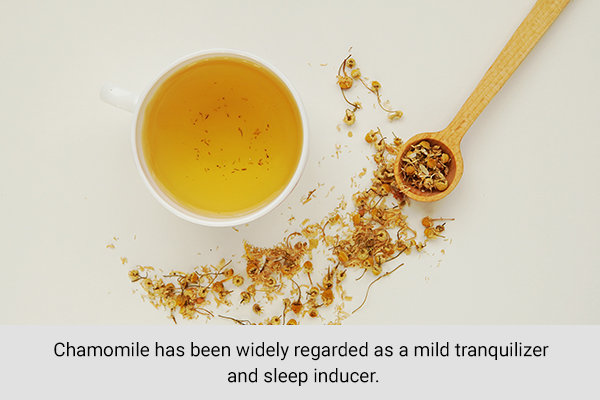
For years, chamomile has been widely regarded as a mild tranquilizer and sleep inducer. (12) These properties of chamomile help one sleep better at night.
In a 2016 study published in the Journal of Advanced Nursing involving postpartum women having poor sleep quality, researchers found that those who drank chamomile tea for a two-week period reported overall better sleep quality than those who did not drink chamomile tea. The study recommended chamomile tea as a supplementary approach to alleviating depression and sleep quality problems. (13)
In another 2017 study involving 60 nursing-home residents, it was found that those who received 400 mg of chamomile extract daily had significantly better sleep quality than those who did not receive any. The study was published in Complementary Therapies in Medicine. (14)
How to use:
- Mix 2 to 3 teaspoons of dried chamomile in a cup of hot water.
- Steep for 3 to 5 minutes.
- Strain it and add 1 teaspoon of honey. You can also add a pinch of cinnamon powder.
- Drink this tea while it is still warm 1 hour before going to bed.
- Do this remedy daily.
7. Lavender oil will help you relax
The aromatic scent of lavender oil has a calming effect on your body, which helps you sleep better. In fact, the pleasant scent of lavender oil is good for the nervous system. It even reduces tension and anxiety and helps create an aura of relaxation to promote sound sleep.
To corroborate this claim, a 2014 study published in the American Journal of Critical Care found that lavender aromatherapy helps improve sleep quality. This randomized controlled pilot study was conducted on a total of 50 patients. (15)
How to use:
- Put 1 or 2 drops of lavender essential oil in a handkerchief and place it near your pillow while you sleep.
- Alternatively, add several drops of lavender oil to a bathtub filled with warm water. Soak in this water for 20 minutes. Do this at least one hour before going to bed.
- You can also mix a few drops of this essential oil in 1 tablespoon of olive oil and rub it on the bottom of each foot before going to bed.
8. Evaluate your room
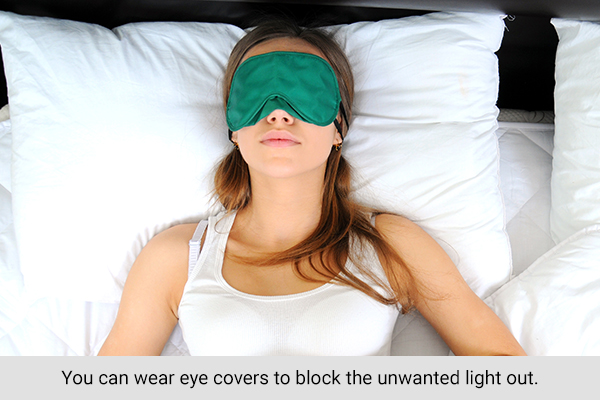
The National Sleep Foundation recommends designing your sleep environment to establish suitable conditions that facilitate quality sleep. (16) This draws legitimacy from the fact that our sleep can be significantly influenced, both adversely and positively, by our bedroom settings.
Be it the temperature of the bedroom, its design, or the amount of noise exposure, all these factors play a key role in determining your sleep quality.
- Keep the temperature of the bedroom cool – between 60°F and 67°F.
- Keep your sleeping space free from any noise or glaring light that can disturb your sleep.
- Keep it clean and tidy and avoid having a pile of clothes on your bed, stacks of the bill on the nightstand, or other random clutter in the room.
- To keep the room dark, consider installing room-darkening shades. You can also wear eye covers to block unwanted light.
- A white noise machine is a nifty tool to ensure that your sleep remains shielded from undue noise disturbances.
9. Choose the right mattress
Buy a good mattress to help you sleep better. You spend several hours of the day in your bed, so it’s worth the investment.
Sleeping on a comfortable mattress with extra pillows to boot can make a huge difference to your sleep quality. In fact, average skin temperature, deep sleep, and sleep efficiency are significantly affected by the comfort level of the mattress. (17)
A medium-firm mattress is an ideal choice as a 2015 study published in Sleep Health shows that a medium-firm mattress that is custom inflated can aid in promoting sleep comfort, quality, and spinal alignment. (18)
Also, bear in mind that your mattress comes with an expiry date. So, try to swap it with a new one every 9 to 10 years. Along with a good supportive mattress, use a pillow that supports your head and neck.
10. Avoid using cell phones in bed

Most of us have the habit of looking at our cell phones just before calling it a day and going to bed. This is something that you need to avoid if you want to sleep soundly.
The light emanating from mobile phones affects your body’s circadian rhythm, and it also stimulates the production of hormones that promote alertness.
In a study published in BMC Public, researchers found that sleep disorders, as well as the stress and symptoms of depression, were associated with excessive mobile phone usage. In this study, young adults (20 to 24 years old) were put under the lens and observed over the course of 1 year. (19)
In another review of several studies published in 2017, researchers found that interventions to limit the use of mobile phones can help address sleep disorders and improve sleep quality. (20)
Therefore, it’s best that an LED screen, be it your mobile phones, your TV, or laptop, should not be the last thing you see before turning in for bed. Switching off these gadgets at least a couple of hours before your bedtime is recommended if you wish to doze off quickly.
Additional Tips to Help Induce Better Sleep
- A magnesium supplement may also help. Consult your doctor for the correct dosage.
- A melatonin supplement can enhance the quality of your sleep. Consult your doctor for the correct dosage.
- Drinking a glass of warm milk before bedtime will definitely help you enjoy sound sleep as it has a relaxing effect on your body and mind.
- Tart cherries contain melatonin, a hormone that helps regulate the sleep-wake cycle. Drink ½ to 1 cup of tart cherry juice twice daily.
Final Word
Sleep loss and sleep disorders are among the most common, yet frequently overlooked health problems. But you must not ignore the problem, as sleeping well is essential for your overall physical and mental health as well as emotional well-being.
Lack of sleep for even a day or two can take a toll on your mood, energy, productivity, and ability to handle stress. If this becomes a regular occurrence, then you need to consult a doctor for a proper diagnosis and treatment.
You can also make healthy changes to your daytime habits and bedtime routine to enjoy better sleep at night. Also, try the above listed natural remedies which can help improve your sleep quality and duration.

- Was this article helpful?
- YES, THANKS!NOT REALLY



